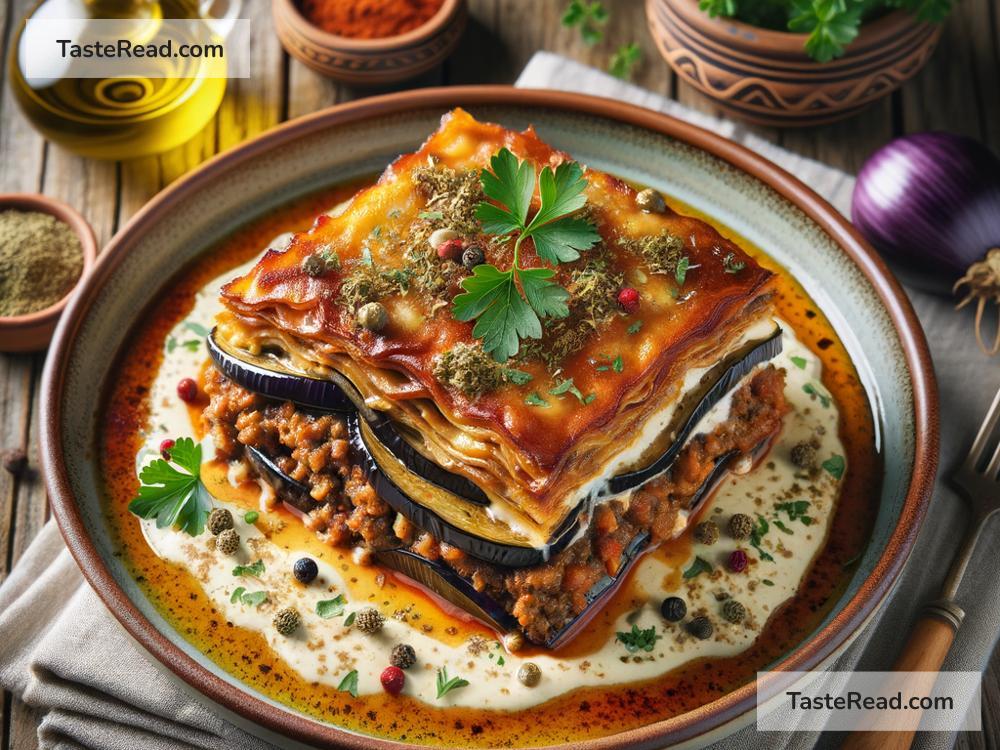The Influence of the Greek Moussaka
Greek cuisine is known for its rich flavors, fresh ingredients, and dishes that tell stories of history and culture. One of the most famous dishes from Greece is moussaka, a hearty and comforting dish that reflects the Mediterranean way of life. While moussaka is famous in Greek cuisine, it has also gained popularity worldwide, influencing other food cultures along the way.
Let’s take a closer look at moussaka, its origins, and how it has left its mark on food traditions around the globe.
What is Moussaka?
Moussaka is a baked dish that layers eggplants, potatoes, and a spiced meat filling—typically made with ground lamb or beef—topped with a creamy béchamel sauce. Each bite combines tender vegetables, savory and spiced meat, and a rich, velvety topping. This dish is often cooked for family meals, celebrations, and gatherings because of its filling and satisfying nature.
In Greece, moussaka is typically seasoned with spices such as cinnamon, allspice, and nutmeg, which give the dish its warm and aromatic flavor. These spices are a reminder of Greece’s connection to the Middle East and the Silk Road, where traders exchanged goods, spices, and culinary ideas.
Where Did Moussaka Come From?
The origins of moussaka are rich and complicated, as the dish shows influences from many cultures. While it is considered a Greek dish today, moussaka’s roots extend far beyond Greece. Similar dishes are found in other countries in the Mediterranean region and the Middle East, each with its own unique twist.
Historians believe that moussaka was influenced by Arabic cuisine. In the Middle East, there is a dish called musakhkhan, which consists of cooked meat and layers of eggplants. This version of layered food eventually reached Greece during times of trade and cultural exchange, leading to the creation of moussaka as we know it today.
When the Ottoman Empire ruled over Greece for centuries, many Turkish cooking techniques and spices were introduced into Greek cuisine. Moussaka, with its layered structure and spiced meat, showcases these influences. However, the Greeks made the dish their own by adding béchamel sauce, a creamy topping borrowed from French cuisine when culinary methods began spreading in the 19th and 20th centuries.
The modern version of moussaka—the one with béchamel sauce—was popularized in the 1920s by Nikolaos Tselementes, a famous Greek chef who looked to bring European-style cooking to Greek cuisine. Tselementes’ adaptation of moussaka transformed it into the iconic Greek dish we recognize today.
Moussaka’s International Influence
The spread of moussaka beyond Greek borders is a testament to its universal appeal. Its flavors and ingredients resonate with people of different cultures, making it a dish that can be adapted to fit local preferences while still holding onto its essence.
Mediterranean Variations
In the Mediterranean region, you’ll find dishes similar to moussaka in countries like Turkey, Egypt, and Lebanon. Turkish moussaka, for example, is often cooked in a slightly different way—it’s not layered but rather cooked in a single pot, combining eggplant, minced meat, tomatoes, and onions. Similarly, Egyptian moussaka skips the béchamel sauce and focuses more on layering fried eggplants with spiced tomato sauce and ground meat.
European and Global Adaptations
As Greek immigrants moved to different parts of the world, they carried their culinary traditions with them, introducing moussaka to new audiences. Today, moussaka is served in many Greek restaurants around the globe, including in the United States, Canada, and Australia. Chefs often tweak the recipe based on local ingredients or dietary needs. For example, vegetarian versions of moussaka replace the meat with lentils or chickpeas, appealing to audiences seeking plant-based meals.
European fusion cooking has also embraced moussaka. In countries such as France and Italy, chefs blend local ingredients and techniques with the flavors of moussaka, resulting in modern interpretations of the dish. The creamy béchamel sauce, a French invention, ties moussaka to other international cuisines effortlessly.
Why Do People Love Moussaka?
So, what makes moussaka so special and beloved by so many? First, it’s the dish’s ability to capture comfort and nostalgia. Many Greeks associate moussaka with family dinners or celebrations, creating fond memories of sharing a meal with loved ones. For those unfamiliar with Greek culture, moussaka provides a delicious entry point to experience Mediterranean flavors.
Second, moussaka is versatile. Whether it’s adapted to be vegetarian, cooked with local spices, or adjusted for modern cooking techniques, moussaka can cater to different dietary preferences and needs. At its core, it remains a dish that is enjoyed across generations and borders.
Finally, moussaka represents history and connection. Each layer tells a story of cultural blending—Arabian spices, Turkish eggplants, French béchamel—woven together on a Greek foundation. This richness in flavor and history makes moussaka not just a meal but a symbol of Greece’s place in the world.
A Lasting Legacy
The influence of Greek moussaka is undeniable. From its humble beginnings to its modern-day adaptations, the dish represents the fusion of different cultures and the timeless appeal of good food.
Whether you find yourself enjoying moussaka in a small restaurant in Athens or sampling a creative twist at a fusion eatery halfway around the world, remember that this dish carries a little piece of history in every bite. It’s a reminder of the power of food to bring people together, share traditions, and bridge cultures.
So next time you take a forkful of moussaka, savor not only the flavors but the story behind this beloved Greek classic!


